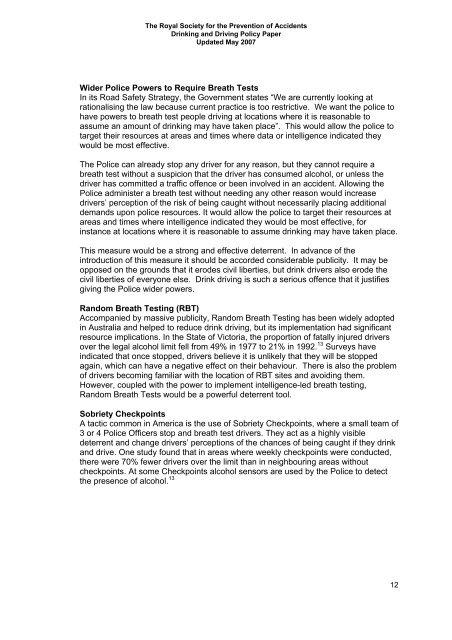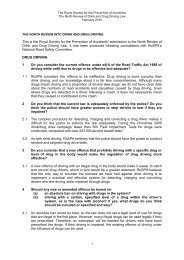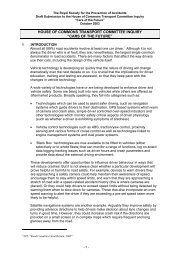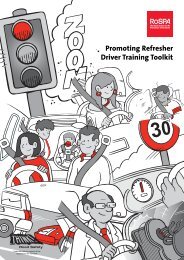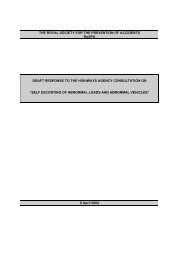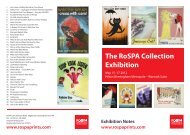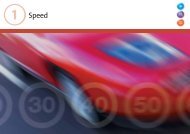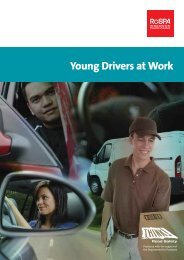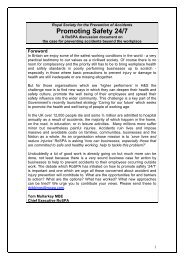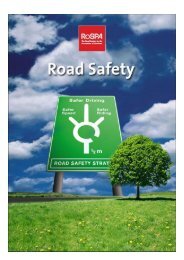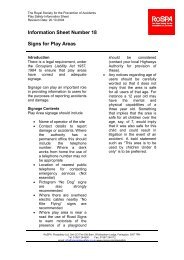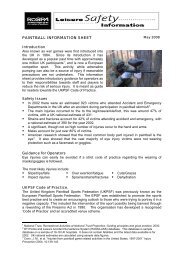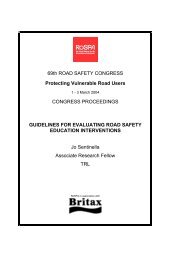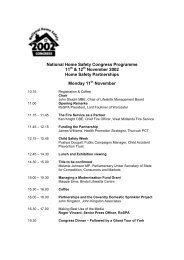RoSPA Drinking and Driving Policy Paper 2007
RoSPA Drinking and Driving Policy Paper 2007
RoSPA Drinking and Driving Policy Paper 2007
Create successful ePaper yourself
Turn your PDF publications into a flip-book with our unique Google optimized e-Paper software.
The Royal Society for the Prevention of Accidents<br />
<strong>Drinking</strong> <strong>and</strong> <strong>Driving</strong> <strong>Policy</strong> <strong>Paper</strong><br />
Updated May <strong>2007</strong><br />
Wider Police Powers to Require Breath Tests<br />
In its Road Safety Strategy, the Government states “We are currently looking at<br />
rationalising the law because current practice is too restrictive. We want the police to<br />
have powers to breath test people driving at locations where it is reasonable to<br />
assume an amount of drinking may have taken place”. This would allow the police to<br />
target their resources at areas <strong>and</strong> times where data or intelligence indicated they<br />
would be most effective.<br />
The Police can already stop any driver for any reason, but they cannot require a<br />
breath test without a suspicion that the driver has consumed alcohol, or unless the<br />
driver has committed a traffic offence or been involved in an accident. Allowing the<br />
Police administer a breath test without needing any other reason would increase<br />
drivers’ perception of the risk of being caught without necessarily placing additional<br />
dem<strong>and</strong>s upon police resources. It would allow the police to target their resources at<br />
areas <strong>and</strong> times where intelligence indicated they would be most effective, for<br />
instance at locations where it is reasonable to assume drinking may have taken place.<br />
This measure would be a strong <strong>and</strong> effective deterrent. In advance of the<br />
introduction of this measure it should be accorded considerable publicity. It may be<br />
opposed on the grounds that it erodes civil liberties, but drink drivers also erode the<br />
civil liberties of everyone else. Drink driving is such a serious offence that it justifies<br />
giving the Police wider powers.<br />
R<strong>and</strong>om Breath Testing (RBT)<br />
Accompanied by massive publicity, R<strong>and</strong>om Breath Testing has been widely adopted<br />
in Australia <strong>and</strong> helped to reduce drink driving, but its implementation had significant<br />
resource implications. In the State of Victoria, the proportion of fatally injured drivers<br />
over the legal alcohol limit fell from 49% in 1977 to 21% in 1992. 13 Surveys have<br />
indicated that once stopped, drivers believe it is unlikely that they will be stopped<br />
again, which can have a negative effect on their behaviour. There is also the problem<br />
of drivers becoming familiar with the location of RBT sites <strong>and</strong> avoiding them.<br />
However, coupled with the power to implement intelligence-led breath testing,<br />
R<strong>and</strong>om Breath Tests would be a powerful deterrent tool.<br />
Sobriety Checkpoints<br />
A tactic common in America is the use of Sobriety Checkpoints, where a small team of<br />
3 or 4 Police Officers stop <strong>and</strong> breath test drivers. They act as a highly visible<br />
deterrent <strong>and</strong> change drivers’ perceptions of the chances of being caught if they drink<br />
<strong>and</strong> drive. One study found that in areas where weekly checkpoints were conducted,<br />
there were 70% fewer drivers over the limit than in neighbouring areas without<br />
checkpoints. At some Checkpoints alcohol sensors are used by the Police to detect<br />
the presence of alcohol. 13 12


